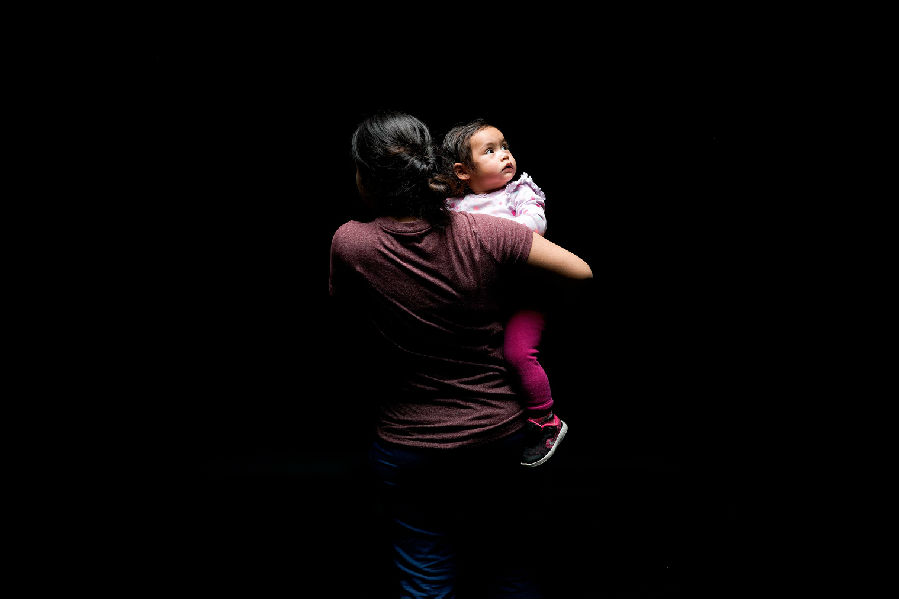再見爸爸,我愛你
AMERICA’S IMMIGRATION POLICY IS SPLITTING FAMILIES AND SPREADING FEAR
美國(guó)的移民政策導(dǎo)致民眾妻離子散,恐懼蔓延
BY Haley Sweetland Edwards
文/哈利· 斯威特蘭·愛德華茲
JUST BEFORE 7:30 ONE FRIDAY MORNING LAST March, Alejandro said goodbye to his wife Maria and his two small daughters and headed off to work.
就在剛過去的三月的一個(gè)周五早晨,時(shí)間剛要到7點(diǎn)半,亞歷杭德羅跟妻子瑪麗亞和兩個(gè)小女兒告別,準(zhǔn)備出門上班。
He didn’t make it far.
但他并未能走遠(yuǎn)。
Four blocks from his home near Bakersfield, Calif.,
他家位于加利福尼亞州貝克斯菲爾德附近,就在距他家四個(gè)街區(qū)的地方,
two unmarked vehicles, a white Honda and a green Mazda pickup truck, pulled up behind him at a stop sign.
兩輛沒有標(biāo)記的警車,一輛白色本田,一輛綠色馬自達(dá)皮卡,在他身后的一個(gè)停車標(biāo)志處停住了。
Plain-clothes Immigration and Customs Enforcement (ICE) agents spilled out.
從車上走下來了幾名身著便衣的移民及海關(guān)執(zhí)法局(簡(jiǎn)稱“ICE”)的官員。
They wore vests emblazoned with the word POLICE.
他們穿著印有警察一詞的背心。
Alejandro dialed Maria from his cell phone and told her what was happening.
亞歷杭德羅用手機(jī)撥通了瑪麗亞的電話,告訴了她這一事情。
Her heart dropped.
她的心都碎了。
She said later that she knew it wouldn’t matter that Alejandro had no criminal record, not even a speeding ticket.
她后來說,她知道,就算亞歷杭德羅沒有犯罪記錄,沒有超速罰單,
Or that he’d driven these same roads every day for the past decade, picking grapes, pistachios and oranges in California’s Central Valley.
就算他過去十年每天都開車經(jīng)過那幾條路,去加利福尼亞州的中央山谷采摘葡萄,開心果和橙子,這些都不重要。

Since 2006, when Alejandro overstayed his visa, he had been considered a “fugitive alien,” in ICE parlance, and therefore subject to immediate deportation to Mexico.
自2006年亞歷杭德羅簽證過期后,他就成了一個(gè),用ICE的說法就是“身為逃犯的外國(guó)人”,應(yīng)該被立即驅(qū)逐到墨西哥。
Now he was arrested on the spot.
如今,他被抓了個(gè)現(xiàn)行。
A few days later, he was given an ankle bracelet and allowed to return home to say goodbye.
幾天后,他被戴上了腳鐐,同時(shí)獲允回家告別。
He was gone by the end of spring—
春天結(jié)束時(shí)——
before his eldest, Isabella, began talking, before Estefania took her first steps, before Maria gave birth this winter to their third baby girl.
還沒等他最大的女兒伊莎貝拉學(xué)會(huì)說話,沒等埃斯特法尼婭學(xué)會(huì)走路,瑪麗亞在今年冬天生下他們的第三個(gè)女兒—— 他就離開了。
Immigrant advocates’ offices, meanwhile, are swamped.
與此同時(shí),移民支持者的辦公室都快被擠爆了。
At a recent “Know Your Rights” session for undocumented immigrants at the United Farm Workers Foundation in Bakersfield,
在貝克斯菲爾德聯(lián)合農(nóng)場(chǎng)工人基金會(huì)最近為無證移民舉辦的“了解你的權(quán)利”會(huì)議上,
the line to enter snaked around the corner and down the block.
排隊(duì)等候入場(chǎng)的人繞著街角,沿著街區(qū)排起了彎彎曲曲的長(zhǎng)龍。
At the Coalition for Humane Immigrant Rights of Los Angeles (CHIRLA),
在洛杉磯人道移民權(quán)利聯(lián)盟(CHIRLA)處,
the waiting room is papered with posters, pamphlets and worksheets with advice on what undocumented people should do if they’re pulled over, their workplace is raided or ICE agents show up at their home.
接待室里貼著海報(bào),小冊(cè)子和工作表,上面有無證移民在被警察攔下,或他們的工作場(chǎng)所被突襲又或者ICE特工出現(xiàn)在他們的家中時(shí)應(yīng)該如何應(yīng)對(duì)的建議。
One handout advises undocumented parents of minors to follow a numbered checklist to be ready in the event that they are picked up.
一份材料上建議有未成年孩子的非法移民父母按照編號(hào)的清單做好相應(yīng)準(zhǔn)備,以防被檢查。
Tip No. 3: “Prepare a letter giving legal power to someone trusted, to care for your children in case you’re arrested.”
其中的第3條建議是:“準(zhǔn)備好一封信,委托你信任的人幫你照顧孩子的法律權(quán)利,以防你被捕。”
譯文由可可原創(chuàng),僅供學(xué)習(xí)交流使用,未經(jīng)許可請(qǐng)勿轉(zhuǎn)載。


